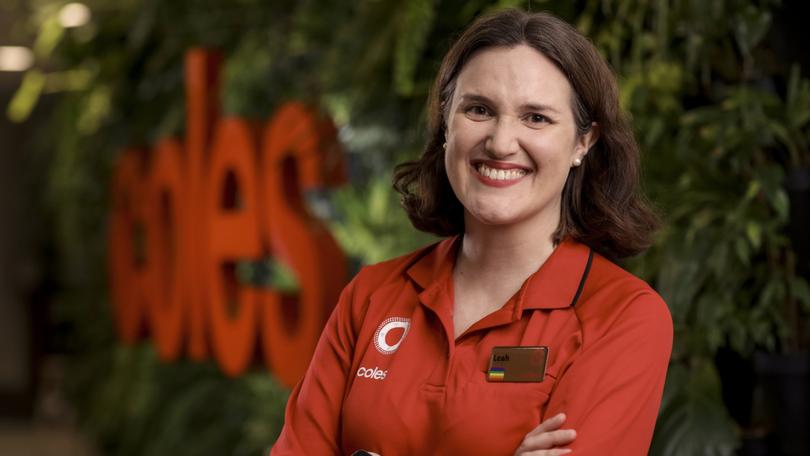Coles boss Leah Weckert says customers can expect more specials amid cost-of-living pressures
Coles boss Leah Weckert says customers can expect further specials as it moves to address cost-of-living pressures as internal research suggests mortgages have overtaken grocery prices as a primary concern.

Coles boss Leah Weckert says customers can expect further specials as the supermarket giant moves to address cost-of-living pressures despite its internal research suggesting mortgages have overtaken grocery prices as the primary financial concern.
Coles on Tuesday reported a 3.6 per cent lower profit in the second half of the financial year despite a sales jump of almost 5 per cent compared to the same time last year, which Ms Weckert attributed to greater product availability and strong, concentrated campaigns and specials, as well as a kids’ collectables promotion.
Shoppers over the past six months were increasingly prepared to travel further to other retailers to find the best value for money, Ms Weckert said, rather than simply choosing their grocery destination on convenience alone, which had been the case for “many years”.
Sign up to The Nightly's newsletters.
Get the first look at the digital newspaper, curated daily stories and breaking headlines delivered to your inbox.
By continuing you agree to our Terms and Privacy Policy.Sales revenue at supermarkets jumped 4.9 per cent to nearly $19.8b, with profit down 3.6 per cent to $594 million. The rate of inflation at Coles is moderating, driven by fresh fruit and vegetables and meat now in deflation, but still elevated farmgate milk prices and other packaged products are keeping inflation overall at 3 per cent.
In the first eight weeks of the third quarter, sales increased 4.9 per cent due, but liquor sales have fallen 2.2 per cent. Ms Weckert said shoppers were curbing their spending on alcohol and its liquor division would look to specials and promotions over coming months to attract customers, as well as highlight its “strong value proposition” across food and liquor.
She also expects inflation to moderate further for dairy and packaged grocery.
Mortgage costs were now the number one cost-of-living concern for 40 per cent of Australians, Coles research outlined, but many were still seeking to bring down their food bills.
“They continue to seek more specials, seek loyalty offers and use catalogues and apps to help manage their grocery costs,” Ms Weckert said.
She added she had recently spent time with customers, accompanying them as they shopped and planned to shop.
“I think one of the things that was really surprising from that for me was that just a number of them were willing to hop in the car to go to places where they knew they could get good value on certain items,” Ms Weckert said. “I do think that is becoming more prevalent.
“In terms of the implications for that for our business, it just means that we need to be sharper and sharper in terms of the value proposition that we are providing, and that’s something we are very focused on.”
Ms Weckert said “fierce” competition in Australia’s grocery sector had helped to keep inflation in Australia lower than in other developed economies.
“One of the things that I actually think is wonderful in Australia is we have a very vibrant food retail market,” she said.
“We are having to work hard every day to work out how we attract customers into our stores.”
Ms Weckert — who alongside outgoing Woolworths boss Brad Banducci will face a Senate inquiry on supermarket prices later this year — said there was sometimes a lack of understanding and recognition that Coles faced more costs than simply what it paid suppliers.
Citing meat as an example, she said on top of the cost of the animal, there were costs associated with abbatoirs, processing, transport to 850 stores nationally and team members putting them on shelves.
“That also has to go into the price that the customer pays,” Ms Weckert said.
Coles’ results largely beat analyst expectations and was, for its supermarkets division stronger than rival Woolworths, last week.
“The business is facing plenty of pressure to make life easier for consumers with lower prices and better value, which is always difficult when juggling the need to deliver continued growth and profitability,” said eToro market analyst Josh Gilbert.
“For now, Coles is managing to keep that balance at an even keel, but the final six months of the year will continue to be a challenge, especially as they navigate the ongoing ACCC inquiry into supermarkets.”
Coles is honing in further on own brand products, with revenue growth twice that of proprietary brand. Its top tier brand, Coles Finest, had 22 per cent growth in the half, while Coles Simply was launched to strong response and volume growth.
In addition to prices on 500 products being cut over summer, more than 1300 products were moved to “everyday low prices”, Ms Weckert said, and “we continue to invest in thousands of weekly specials and promotions”.
It has also relaunched its “what’s for dinner” campaign, highlighting recipes at price points for a family of four from $10 to $25, as well as new features in its app to compare prices by unit size — similar to Woolworths — and shopping lists.
Elsewhere, Coles reported a decline in stock loss and theft after installing smart exit gates at hundreds of supermarkets.
